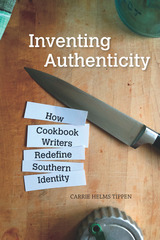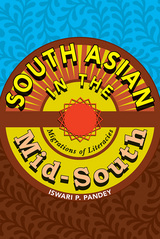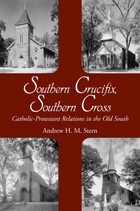3 books about Southern states

Inventing Authenticity
How Cookbook Writers Redefine Southern Identity
Carrie Helms Tippen
University of Arkansas Press, 2018
In Inventing Authenticity, Carrie Helms Tippen examines the rhetorical power of storytelling in cookbooks to fortify notions of southernness. Tippen brings to the table her ongoing hunt for recipe cards and evaluates a wealth of cookbooks with titles like Y’all Come Over and Bless Your Heart and famous cookbooks such as Sean Brock’s Heritage and Edward Lee’s Smoke and Pickles. She examines her own southern history, grounding it all in a thorough understanding of the relevant literature. The result is a deft and entertaining dive into the territory of southern cuisine—“black-eyed peas and cornbread,fried chicken and fried okra, pound cake and peach cobbler,”—and a look at and beyond southern food tropes that reveals much about tradition, identity, and the yearning for authenticity.
Tippen discusses the act of cooking as a way to perform—and therefore reinforce—the identity associated with a recipe, and the complexities inherent in attempts to portray the foodways of a region marked by a sometimes distasteful history. Inventing Authenticity meets this challenge head-on, delving into problems of cultural appropriation and representations of race, thorny questions about authorship, and more. The commonplace but deceptively complex southern cookbook can sustain our sense of where we come from and who we are—or who we think we are.
Tippen discusses the act of cooking as a way to perform—and therefore reinforce—the identity associated with a recipe, and the complexities inherent in attempts to portray the foodways of a region marked by a sometimes distasteful history. Inventing Authenticity meets this challenge head-on, delving into problems of cultural appropriation and representations of race, thorny questions about authorship, and more. The commonplace but deceptively complex southern cookbook can sustain our sense of where we come from and who we are—or who we think we are.
[more]

South Asian in the Mid-South
Migrations of Literacies
Iswari P. Pandey
University of Pittsburgh Press, 2015
Winner of the 2017 CCCC Advancement of Knowledge Award.
In an age of global anxiety and suspicion, South Asian immigrants juggle multiple cultural and literate traditions in Mid-South America. In this study Iswari P. Pandey looks deeply into this community to track the migration of literacies, showing how different meaning-making practices are adapted and reconfigured for cross-language relations and cross-cultural understanding at sites as varied as a Hindu school, a Hindu women’s reading group, Muslim men’s and women’s discussion groups formed soon after 9/11, and cross-cultural presentations by these immigrants to the host communities and law enforcement agencies. Through more than seventy interviews, he reveals the migratory nature of literacies and the community work required to make these practices meaningful.
Pandey addresses critical questions about language and cultural identity at a time of profound change. He examines how symbolic resources are invented and reinvented and circulated and recirculated within and across communities; the impact of English and new technologies on teaching, learning, and practicing ancestral languages; and how gender and religious identifications shape these practices. Overall, the book offers a thorough examination of the ways individuals use interpretive powers for agency within their own communities and for cross-cultural understanding in a globalizing world and what these practices mean for our understanding of that world.
In an age of global anxiety and suspicion, South Asian immigrants juggle multiple cultural and literate traditions in Mid-South America. In this study Iswari P. Pandey looks deeply into this community to track the migration of literacies, showing how different meaning-making practices are adapted and reconfigured for cross-language relations and cross-cultural understanding at sites as varied as a Hindu school, a Hindu women’s reading group, Muslim men’s and women’s discussion groups formed soon after 9/11, and cross-cultural presentations by these immigrants to the host communities and law enforcement agencies. Through more than seventy interviews, he reveals the migratory nature of literacies and the community work required to make these practices meaningful.
Pandey addresses critical questions about language and cultural identity at a time of profound change. He examines how symbolic resources are invented and reinvented and circulated and recirculated within and across communities; the impact of English and new technologies on teaching, learning, and practicing ancestral languages; and how gender and religious identifications shape these practices. Overall, the book offers a thorough examination of the ways individuals use interpretive powers for agency within their own communities and for cross-cultural understanding in a globalizing world and what these practices mean for our understanding of that world.
[more]

Southern Crucifix, Southern Cross
Catholic-Protestant Relations in the Old South
Andrew Henry Stern
University of Alabama Press, 2012
Southern Crucifix, Southern Cross examines the complex and often overlooked relationships between Catholics and Protestants in the antebellum South.
In sharp contrast to many long-standing presumptions about mistrust or animosity between these two groups, this study proposes that Catholic and Protestant interactions in the South were characterized more by cooperation than by conflict.
Andrew H. M. Stern argues that Catholics worked to integrate themselves into southern society without compromising their religious beliefs and that many Protestants accepted and supported them. Catholic leaders demonstrated the compatibility of Catholicism with American ideals and institutions, and Protestants recognized Catholics as useful citizens, true Americans, and loyal southerners, in particular citing their support for slavery and their hatred of abolitionism.
Mutual assistance between the two groups proved most clear in shared public spaces, with Catholics and Protestants participating in each other’s institutions and funding each other’s enterprises. Catholics and Protestants worshipped in each other’s churches, studied in each other’s schools, and recovered or died in each other’s hospitals.
In many histories of southern religion, typically thought of as Protestant, Catholicism tends to be absent. Likewise, in studies of American Catholicism, Catholic relationships with Protestants, including southern Protestants, are rarely discussed. Southern Crucifix, Southern Cross is the first book to demonstrate in detail the ways in which many Protestants actively fostered the growth of American Catholicism. Stern complicates the dominant historical view of interreligious animosity and offers an unexpected model of religious pluralism that helped to shape southern culture as we know it today.
[more]
READERS
Browse our collection.
PUBLISHERS
See BiblioVault's publisher services.
STUDENT SERVICES
Files for college accessibility offices.
UChicago Accessibility Resources
home | accessibility | search | about | contact us
BiblioVault ® 2001 - 2024
The University of Chicago Press









